

Make Me A Genius - Educational Vids. Learningscience.org. Flipped Classroom. Move Over Harvard And MIT, Stanford Has The Real “Revolution In Education” Lectures are often the least educational aspect of college; I know, I’ve taught college seniors and witnessed how little students learn during their four years in higher education.
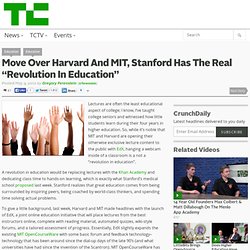
So, while it’s noble that MIT and Harvard are opening their otherwise exclusive lecture content to the public with EdX, hanging a webcam inside of a classroom is a not a “revolution in education”. A revolution in education would be replacing lectures with the Khan Academy and dedicating class time to hands-on learning, which is exactly what Stanford’s medical school proposed last week. Stanford realizes that great education comes from being surrounded by inspiring peers, being coached by world-class thinkers, and spending time solving actual problems. So, last week, two Stanford professors made a courageous proposal to ditch lectures in the medical school. Skeptical readers may argue that Khan Academy can’t compete with lectures from the world’s great thinkers. [Image via the University of Waterloo.] Flipped learning: A response to five common criticisms. One of the reasons this debate exists is because there is no true definition of what “flipped learning” is.
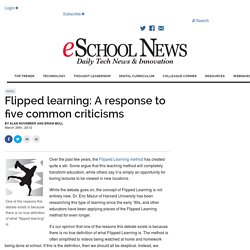
Over the past few years, the Flipped Learning method has created quite a stir. Some argue that this teaching method will completely transform education, while others say it is simply an opportunity for boring lectures to be viewed in new locations. While the debate goes on, the concept of Flipped Learning is not entirely new. Dr. Ending the 'tyranny of the lecture' Harvard professor Eric Mazur reveals how he uses peer instruction to make learning more dynamic—and how new software can facilitate this process By Dennis Pierce, Editor Read more by Dennis Pierce July 27th, 2011 Students need to assimilate information before they can apply it to a different context, Mazur said.
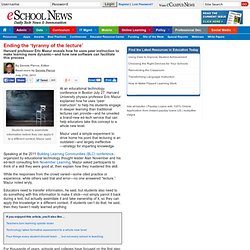
At an educational technology conference in Boston July 27, Harvard University physics professor Eric Mazur explained how he uses “peer instruction” to help his students engage in deeper learning than traditional lectures can provide—and he unveiled a brand-new ed-tech service that can help educators take this concept to a whole new level. Mazur used a simple experiment to drive home his point that lecturing is an outdated—and largely ineffective—strategy for imparting knowledge. While the responses from the crowd varied—some cited practice or experience, while others said trial and error—no one answered “lecture,” Mazur noted wryly. Bozemanbiology.
DP AP Biology - AP Biology Poster Board-Presentations. Science Videos Search Engine. Home. ABC Science. Hot tags Weather Climate Change Planets and Asteroids Archaeology Fossils Editor's choice Sunday, 15 January 2017 RN Offtrack Counting birds to save the Murray-Darling Friday, 18 November 2016.
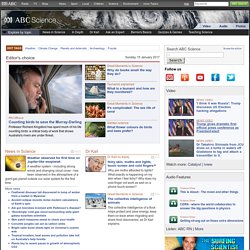
Science Classroom. Lessons Microscope Mania Pond Water Survey Hydra Investigation Animal Classification Challenge Incredible Edible Cells - Cell Project Construction Zone - Cell Project Mitosis Flip Books Genetics with a Smile + SpongeBob Genetics DNA Keychains & Replication Protein Power Game Egg-cellent Ideas for Osmosis & Diffusion Human Body Activities (Body Systems, Skeletal System, Muscular System) Also see Silly Science - a dichotomous key activity in General Science section!
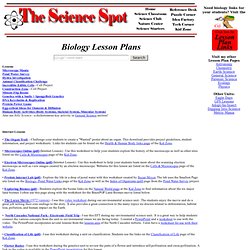
Internet Lessons • The Organ Trail - Challenge your students to create a "Wanted" poster about an organ. This download provides project guidelines, student information, and project worksheets. Links for students can be found on the Health & Human Body links page of the Kid Zone. • Microscopes Online (pdf) (Internet Lesson) - Use this worksheet to help your students explore the history of the microscope as well as other sites listed on the Cells & Microscopes page of the Kid Zone . Also available. . . . | Back to top | Geologic Time: Graphical Representation of Geologic Time. Synthetic Biology. Synthetic biology is perhaps the most accelerating science.

In fact, since biology became an information technology, for the past several years synthetic biology has been developing even faster than Moore's Law. And just one example - paralel to the pioneering days of computer science, is the explosion in DIY biology garage-based hacker labs. There is a large and rapidly growing number of relevant YouTube videos. J. Craig Venter: Designing Life - 60 Minutes. New Sims. 21 Things That Will Be Obsolete by 2020.
A Global Science Community. 100 Coolest Science Experiments on YouTube - X-Ray Technician Schools. Although YouTube has something of a reputation as a repository for the inane mental diarrhea of stunted man-children injuring each other for cheap laughs or shrill teenage drama queens shrieking like harpies over the latest bland, interchangeable lump passing as the epitome of masculine beauty, many others thankfully take advantage of its services as a portal to share their knowledge and educate viewers.
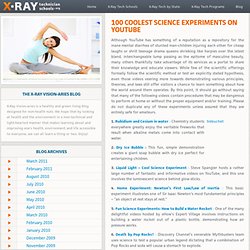
While few of the scientific offerings formally follow the scientific method or test an explicitly stated hypothesis, even those videos veering more towards demonstrating various principles, theories, and laws still offer visitors a chance to learn something about how the world around them operates. By this point, it should go without saying that many of the following videos contain procedures that may be dangerous to perform at home or without the proper equipment and/or training. Please do not duplicate any of these experiments unless assured that they are entirely safe for amateurs.
Videos. Synthetic Biology. Companies. EVOLUTION IN ACTION. Evolution of Life on Earth. Evolution. Evolution Resource: Teachers. Life on Earth. Biologia. Science. Science. STEM. Exploratorium: the museum of science, art and human perception. CPBIO. APBIO. CHEMISTRY.